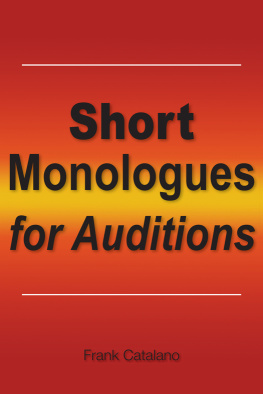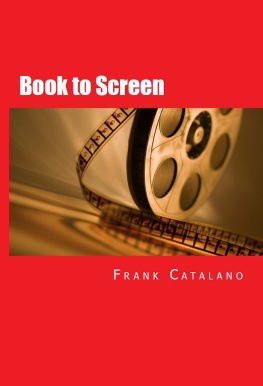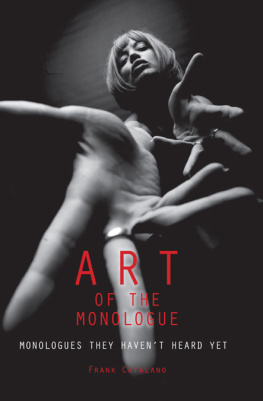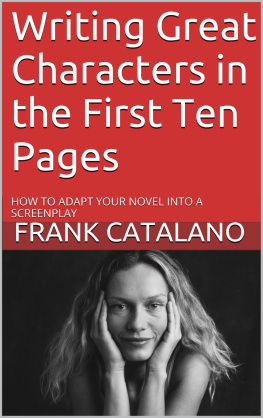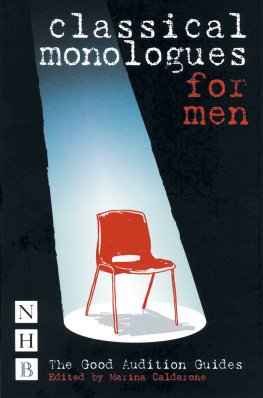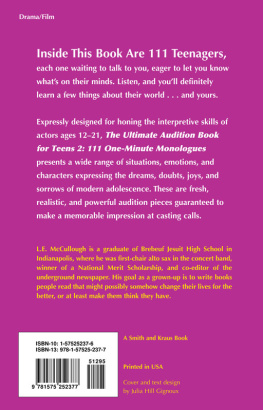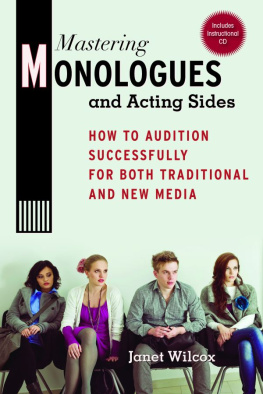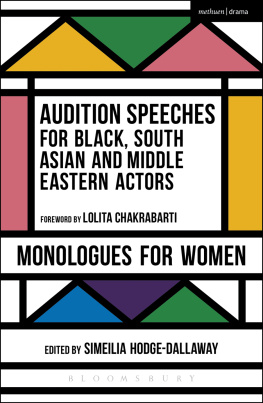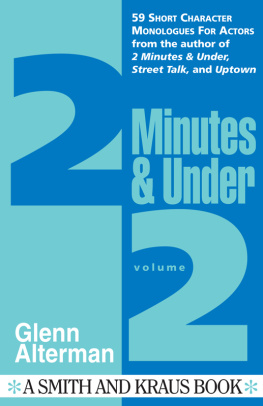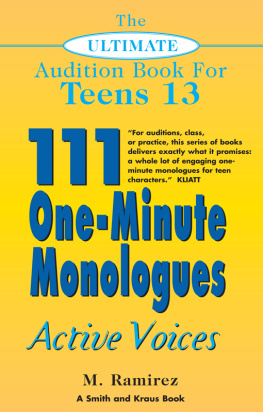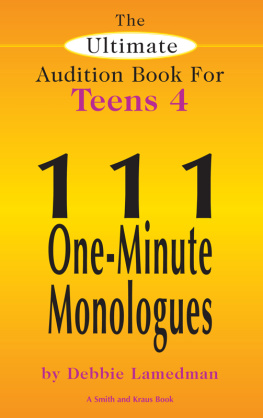Frank Catalano - Short Monologues for Auditions
Here you can read online Frank Catalano - Short Monologues for Auditions full text of the book (entire story) in english for free. Download pdf and epub, get meaning, cover and reviews about this ebook. year: 2013, publisher: Lexington Avenue Press, genre: Detective and thriller. Description of the work, (preface) as well as reviews are available. Best literature library LitArk.com created for fans of good reading and offers a wide selection of genres:
Romance novel
Science fiction
Adventure
Detective
Science
History
Home and family
Prose
Art
Politics
Computer
Non-fiction
Religion
Business
Children
Humor
Choose a favorite category and find really read worthwhile books. Enjoy immersion in the world of imagination, feel the emotions of the characters or learn something new for yourself, make an fascinating discovery.
- Book:Short Monologues for Auditions
- Author:
- Publisher:Lexington Avenue Press
- Genre:
- Year:2013
- Rating:5 / 5
- Favourites:Add to favourites
- Your mark:
- 100
- 1
- 2
- 3
- 4
- 5
Short Monologues for Auditions: summary, description and annotation
We offer to read an annotation, description, summary or preface (depends on what the author of the book "Short Monologues for Auditions" wrote himself). If you haven't found the necessary information about the book — write in the comments, we will try to find it.
How to select monologues by your casting type, prepare and perform them for auditions. Includes 70 original audition monologues. Also, great for acting classes.
Short Monologues for Auditions — read online for free the complete book (whole text) full work
Below is the text of the book, divided by pages. System saving the place of the last page read, allows you to conveniently read the book "Short Monologues for Auditions" online for free, without having to search again every time where you left off. Put a bookmark, and you can go to the page where you finished reading at any time.
Font size:
Interval:
Bookmark:
Lexington Avenue Press
Copyright 2013 Frank Catalano
All rights reserved.
ISBN: 148236980X
ISBN-13: 9781482369809
eBook ISBN-13: 9781625172587
A s an author, I have written several monologue books including ART OF THE MONOLGUE and WHITE KNIGHT BLACK NIGHT both of which focused on the performance of a monologue as an artistic work. This current volume focuses on the presentation of monologues specifically for the purpose of auditions and acting classes. The difference here is that the actual selection and presentation of the material is focused more upon the actors abilities and type than the performance or the material. Why short monologues? As an acting teacher, I have always advised my students less is more. What does that actually mean? In this case, I want the actor to focus specifically on a given purpose in the presentation of each piece. The given purpose of an audition is to provide the auditioner a sample of your acting abilities, your demeanor, your ability to take direction and ultimately to determine whether or not you are the right fit for what they are looking for. But, lets be honest, a casting director is rarely if ever going to have you perform a monologue if they are reading people for a specific role. They will just have you perform the actual lines of the character that you are reading for. So what would be the purpose of a monologue? In a larger sense, a director of a theatre company, a university theatre school, an agent or manager might want to see how you perform prepared material. They would want to see how you create the moment on your own so they can have an idea of the kind of actor you really are. To accomplish this, you need to present something thats brief, to the point and gives them an idea of who you are and what you can do. They dont need the whole performance, just a sample. An actor should have at least two short contemporary monologues (one comedy and one dramatic) ready to go at all times. If you want to be totally prepared you can add at least one or two short classical monologues to your acting arsenal. But heres the rub. If you prepare, well-known material from familiar sources, most auditioners will have seen and heard other actors do these same monologues. Here, you run the danger of comparison. As you perform, they will be thinking about the last person that presented the same material. How did they do it? How does your interpretation differ? Which one is better? You dont want them thinking about anything other than you. To hedge your bet, you should select monologues that are new and fresh to their ear. Show them something new that is a perfect fit for just you. Something, that they can only imagine you performing. It should show what you can do emotionally, intellectually and physically and most importantly be brief and to the point. Brief and to the point means about one to two minutes. Remember, your performance is a sample of what you can do, not the whole performance. If they want a whole performance, they need to cast you or buy a ticket.
Shorter monologues are also great to use within an acting class. Like an audition, you want to bring into the class a short sample of your acting ability or to showcase a specific aspect of your talent. If your strong suit is emotional roles, prepare a short emotional monologue. If its physicality, then prepare something that relies centrally upon your ability to move within the space. This is no secret. Acting teachers and students prefer shorter monologues for class presentations. Why? This allows both the teacher and the student the ability to focus on specific acting issues rather than restating them over and over again within a cumbersome presentation. Usually, your acting teacher (just like a casting director) pretty much knows what they need to work on with you after the first minute of your presentation. So, why not dazzle them with a presentation thats short and sweet. Give just enough to make them interested but leave them wanting for more. If you can do that, you are where you need to be.
This book contains seventy individual monologues that can be performed by male or female characters. There is an equal mix of comedy and drama and all are within the one to two minute time range. You might be thinking, which one is right for me? Find a piece that you can closely connect to either on an emotional or intellectual level. Put yourself in the space as the character and let the monologue do the rest of the work. Ultimately, the right monologue for you is one that they have never seen that showcases your unique talents. Think of an audition monologue as a means to end. As an audition piece, its going to exhibit what you can do and where you would fit in to a particular company or agent roster. As a class exercise its going to give your acting teacher a specific insight about who you are, your talents and what areas of acting you need to work on.
Lastly, monologues like everything else, are subject to our tastes and needs at any given moment. Dont be afraid to try many different monologues as your creative growth progresses or you feel you need to do something different. Make this book your source for the magic that you will do. Go back to it again and again whenever you feel there is a need for it.
The American Heritage Dictionary defines a monologue as a long speech made by one person, often monopolizing a conversation. You may be thinking, I already know that, tell me something I dont know. Okay, a monologue when spoken can reveal a small part of a characters soul. Think of those thoughts in which you have spoken aloud to someone or yourself. The words you speak come from within you and have special meaning. Unless, you count as monologues leaving phone messages, placing your order at the automated machine at Jack in the Box or trying to talk on the phone to customer service at your bank. It is true that a monologue is a speech made by one person but really it is a lot more than just that. What the person says in his/her speech should be worthy of speech itself to be considered a monologue. What am I saying? It should be a speech connected in some core way to your characters intellectual, emotional, spiritual and physical state. If it is not that, then it is not a monologue. It is whatever it is: leaving a phone message, ordering a cheeseburger or trying to find out why your check has bounced.
Within the framework of a performing arts presentation, a monologue is one person speaking for an extended period alone or with other characters upon the stage or within a camera shot. The speech can be the characters thoughts spoken aloud to himself or herself, to another character, to the audience or an object or entity. How a monologue is presented has a lot to do with the reality of the universe the character lives in and to a greater extent the point of view or creative framework of the presentation. I am defining point of view as how a creative work is presented to its audience. Several years ago, I attended a production of William Shakespeares Hamlet at small theatre in Los Angeles. I sat in the first row about three feet from the actor who played Hamlet as he uttered those famous lines To be or not to be I had experienced this soliloquy dozens of times before within a representational framework where the Hamlet character reveals his inner thoughts by speaking to himself out loud. In this particular production, the actor who played Hamlet turned toward me and asked the famous question, To be or not to be? At first I wanted to blurt out like Robert Di Niro in Taxi Driver, Are you talking to me? But, somehow thought it might not be appropriate. So I said nothing. But, I did give him a look of acknowledgment. As if to say
Font size:
Interval:
Bookmark:
Similar books «Short Monologues for Auditions»
Look at similar books to Short Monologues for Auditions. We have selected literature similar in name and meaning in the hope of providing readers with more options to find new, interesting, not yet read works.
Discussion, reviews of the book Short Monologues for Auditions and just readers' own opinions. Leave your comments, write what you think about the work, its meaning or the main characters. Specify what exactly you liked and what you didn't like, and why you think so.

